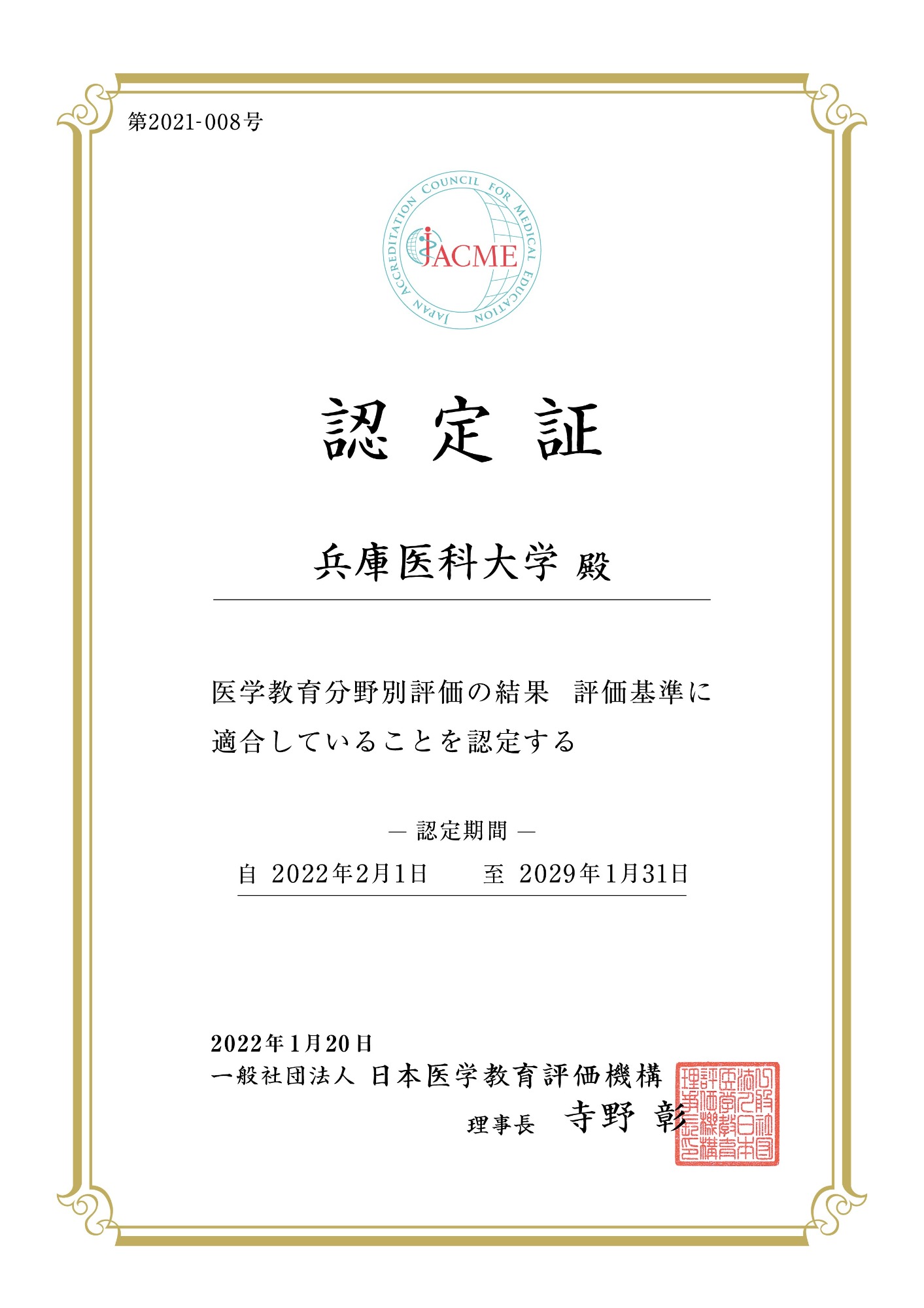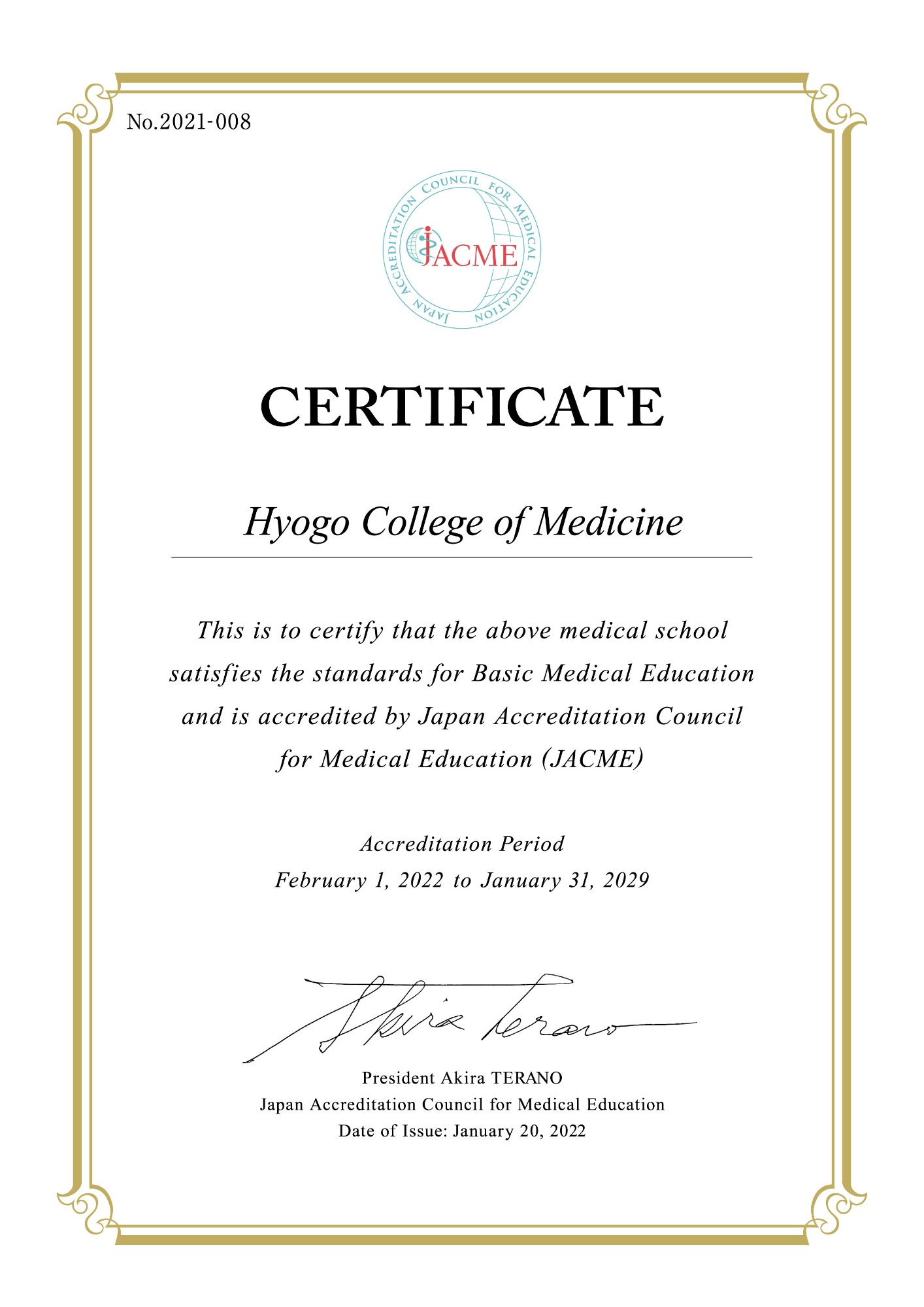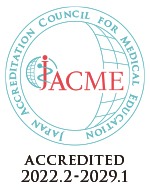Educational evaluation by field
School of Medicine (Japan Council for Medical Education)
Evaluation by medical education field
Our School of Medicine underwent accreditation by the Japan Accreditation Council for Medical Education based on the medical education field-specific evaluation criteria Ver. 2.32, and our medical education was found to be in compliance with the evaluation criteria.
Certification period: February 1, 2022 to January 31, 2029
(Field survey: May 31 to June 4, 2021)
The evaluation results for compliance with the standards were as follows: among the 36 sub-areas, 27 items met the basic standard, 9 items partially met, 26 items met the standard for quality improvement, 9 items partially met, and there were no non-compliant items.
Items that were evaluated and advice and suggestions for improvement
There were 4 items that were "highly rated" and 14 items that were "evaluable," for a total of 18 items that were "evaluable." Of particular note are that 2 items were highly rated as learning support, and 1 item was evaluated as being "evaluable," for a total of 3 items.
Additionally, each committee will continue to work on advice and suggestions for improvement, and we will continue to inspect and revise the evaluated items to adapt them to changes in the surrounding environment.
Items that can be highly evaluated
1. The diploma policy defines 12 elements of ability for each of the four areas, and clearly indicates the learning outcomes for each item in four milestone stages: S (after completion of postgraduate clinical training), A (at graduation), B (before the start of clinical training), and C (at the completion of the basic skills training period).
2. We are engaged in multi-disciplinary collaborative education in collaboration with three faculties of Hyogo University of Health Sciences (School of Pharmacy, School of Nursing, School of Rehabilitation), and from the first year we have been conducting joint group work and presentations by the four faculties in a TBL format on themes such as bioethics and pain.
3. Allocate the necessary resources to support students, such as advisory teachers, homeroom teachers, and Medical Education Center, and work with related departments to provide individual support.
4. There must be a support system in place that is tailored to the circumstances of each student, such as support for female students who are absent due to pregnancy/childbirth, developmental disabilities, or other individual circumstances, and the establishment of a sick child care room that students can use.
Items that can be evaluated
1. An educational program that fosters the awareness and ability to continue self-improvement throughout one's life, implemented in stages over a six-year period.
2. There is a "research physician course" that allows students to fully engage in medical research up to the upper grades.
3. A systematic education on pain is provided over a six-year education period, and an educational system has been established to train medical professionals capable of providing multidisciplinary pain care.
4. Individual practical exams are conducted during the Department of Biochemistry practical training.
5. The school operates a "Founding Spirit Portfolio" that collects students' work, self-evaluations, teacher evaluations, and reflective records during their time at the school.
6. Medical Education Center provides individual learning support based on each student's educational progress.
7. We clearly define "Guidelines for faculty recruitment, activities, and ability development," "The type of personnel Hyogo Medical University is seeking," and "Human Resources Development Policy," and we recruit, employ, and develop faculty members accordingly.
8. Hyogo Medical University has formulated a policy for improving the education and research environment and is improving the learning environment.
9. Have a system that records lectures given in large lecture halls and allows them to be viewed on campus terminals.
10. We have a credit exchange system with Kwansei Gakuin University and other universities, and have exchanges between faculty, staff, and students.
11. The four Kansai universities have mutual access to clinical training.
12. The "Kansai 5 Universities Research Doctor Training Course Consortium Training Camp" is held every year to support self-improvement through interaction between students and faculty members from other universities.
13. The university has strengthened its administrative and professional organizations in order to carry out its educational programs.
14. In close collaboration with Hyogo Prefecture and relevant health and medical departments, Hyogo Medical University maintains a high retention rate of graduates within Hyogo Prefecture through the Hyogo Prefecture recommendation admission system.


